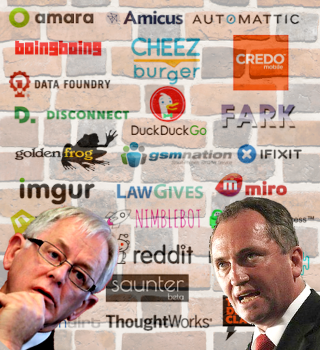Tech firms try for transparency while Joyce dangles cows
 Some of the world’s leading online companies and communities have spoken out about efforts to “fast track” the Trans-Pacific Partnership, saying governments should ease up in their push to create a corporate-friendly, freedom-restricting future.
Some of the world’s leading online companies and communities have spoken out about efforts to “fast track” the Trans-Pacific Partnership, saying governments should ease up in their push to create a corporate-friendly, freedom-restricting future.
More than 25 of the most prominent internet-based companies have compiled a public letter urging legislators in the US not to allow a “fast track” authority to be set up.
The tech companies say they demand more transparency and better opportunities for public participation in negotiations which will affect Internet freedom, free speech, and the internet economy.
They say with so many human interests at stake across the countries negotiating the large-scale trade agreement, it is preposterous that talks would be occurring so secretly.
“None of the usual justifications for trade negotiation exclusivity apply to recent agreements like the TPP,” the letter states.
“Even assuming that it is legitimate to shield the discussions of certain trade barriers - like import tariffs - from political interference, the provisions in these new trade agreements go far beyond such traditional trade issues.
“Anticipated elements such as harsher criminal penalties for minor, non-commercial copyright infringements, a 'take-down and ask questions later' approach to pages and content alleged to breach copyright, and the possibility of Internet providers having to disclose personal information to authorities without safeguards for privacy will chill innovation and significantly restrict users' freedoms online.”
The leaders of the internet landscape, including reddit, Automattic (WordPress.com), Imgur, DuckDuckGo, CREDO Mobile, BoingBoing, Thoughtworks, Namecheap, and Cheezburger directly their missive at the recently-appointed US Chair of the Senate Finance Committee Senator Ron Wyden.
Senator Wyden is considered a staunch defender of users’ and online rights, escpeically in his defence of the similarly-restrictive SOPA and PIPA laws.
The companies have urged Senator Wyden to maintain his dedication from prior efforts to bring transparency and public participation to trade negotiations.
“We strongly urge you to uphold and expand this dedication into your new role,” the public letter states.
“TPP is the first step toward internet censorship, and simultaneously, pressures ISPs to monitor their users' activity. People have already spoken, and this is not what they want,” said Andrew Lee of Private Internet Access.
“However, if ‘fast track’ powers are enabled, democracy will cease to exist and this may very well become a reality. We absolutely cannot let this happen.”
Meanwhile, in Australian negotiations, Agriculture Minister Barnaby Joyce has reportedly threatened Japanese authorities over a refusal to lower beef tariffs.
A leading Japanese newspaper, the Nikkei Business Daily, says Mr Joyce has told trade-negotiator Koya Nishikawa that if Japan will not relax tariffs on Australian beef, he would simply send it to China.
“There is plenty of demand for Australian beef from China,” the paper quotes Mr Joyce.
“So if necessary, Australia does not need to go to the trouble of selling it to Japan.”
The report describes the Agriculture Minister’s face as being “red with fervor”, and that his comments “as a surprise to Nishikawa, who had met with the Prime Minister earlier that day to reaffirm that both nations were on the same page in terms of inking a bilateral trade agreement as soon as possible.”
The Nikkei paper says Mr Joyce and Australian Trade Minister Andrew Robb are looking for a similar deal with Japan to the one just signed with South Korea.
The deal will see South Korea cut its tariffs on beef, sugar, dairy, wheat, wine, horticulture and seafood, while Australia will do the same for its restrictions on electronics, white goods, cars and steel.
Independent groups monitoring both the Trans-Pacific Partnership and the Korea-Australia Free Trade Agreement are concerned about new investor-state dispute laws, which will allow private companies and corporations to sue countries that inhibit their business practices.








 Print
Print